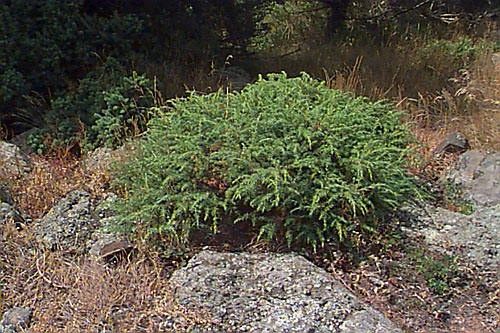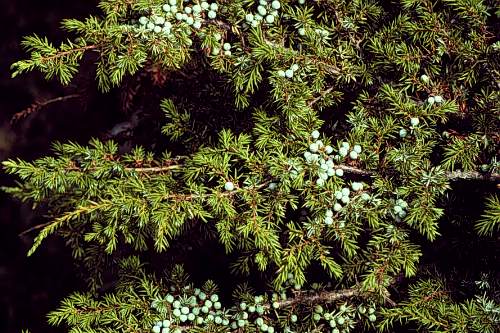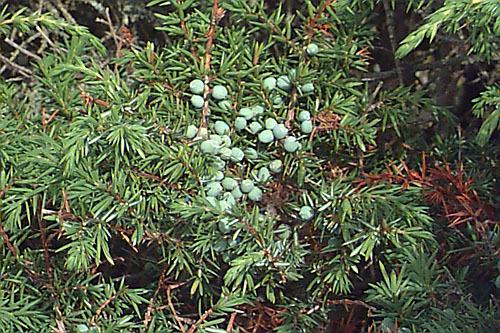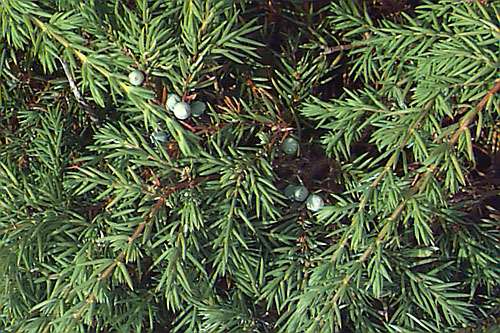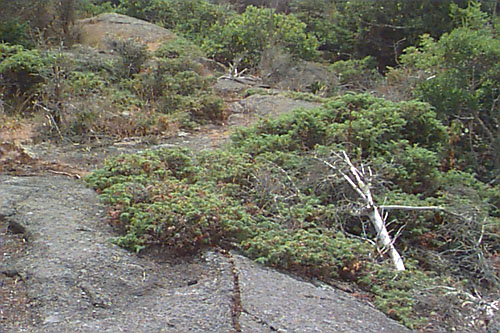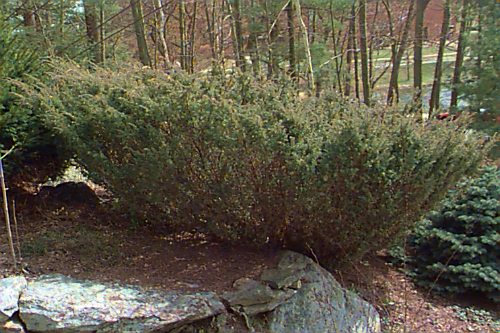Juniperus communis
Common Juniper
Cupressaceae
ExpandHabitat
- zone 2
- native to northern parts of Asia, Europe and the United States
- has one of the widest distributions of any shrub
Habit and Form
- evergreen
- medium-sized tree with wide spreading branches
- branches pointed upwards, typically at a 45oF angle from the ground
- usually found as a multi-branched shrub
- 5' to 10' tall and 8' to 12' wide
- slow growth
- medium texture
Summer Foliage
- awl-shaped needles
- needles persist for 3 years
- needles set at a wide angle from stem
- needles are concave with a broad white band on upper-side
- blunt needle tip
- gray-green to blue-green in color
- needles can be found in whorls of 3 on branchlets
Autumn Foliage
- evergreen, no fall color
- needles turn yellowish brown during winter months
- can be unattractive
Flowers
- dioecious
- staminate flowers yellow
- no ornamental value
Fruit
- 3-seeded cone, sessile or on short stalks
- globose in shape
- 0.33" to 0.5" in diameter
- blue-black in color with a waxy bloom
- ripens during second or third year
- used for flavoring gin
Bark
- reddish brown
- flaking off in thin strips
- typically hidden by foliage
Culture
- easily transplanted
- grows on poor sites
- wind tolerant
- full sun
- pH adaptable
- once established little maintence required
- not as heat tolerant as other Juniperus species
Landscape Use
- naturalized plantings
- poor soil sites
- hedges
- mass plantings
Liabilities
- susceptible to juniper blights
- yellow-brown foliage color that develops in the cold months may be objectionable to some
ID Features
- needles in 3's
- long awl needles
- needles pointed
- brown winter color
- gray to brown fruits in winter
- often confused with J. conferta, but J. communis has a white stomatal line that is broader than the green margin, white J. conferta has a green line down the middle of a narrow white stomatal line.
Propagation
- by cuttings for cultivars
- by seed, but habit can be variable
Cultivars/Varieties
'AmiDak' (Blueberry Delight™) - This selection of J. c. var. depressa is a dense, low spreading plant growing only 1' tall and up to 5' wide. The foliage is dark green with a silvery line on top. It is an extremely hardy plant selected in North Dakota.
'Depressa' (also listed as var. depressa) - This is a low growing, vase-shaped shrub that rarely exceeds 4' tall. The needles have an upper blue band, but the foliage discolors in winter. This plant is extremely cold hardy and tolerant of difficult growing conditions.
'Gold Beach' - A low-growing, spreading plant only 6" tall and 2' wide, this plant feature yellow new growth which fades to green.
'Hibernica' - An older cultivar (the "Irish Juniper"), this plant is densely upright in habit to 15' tall with bluish foliage. This plant seems to fail with age in most garden situations.
'Pencil Point' - This novelty is extremely columnar, growing 5' tall and only 10" wide with green foliage.
'Repanda' - A neat, low-growing selection reaching 16" tall and forming round mounds. The green foliage yellow slightly in winter.
'Saxatilis' (also listed as var. saxatilis) - Forms listed under this name are generally low-growing with blue-green needles.
